Remote Signing – An irreversible trend
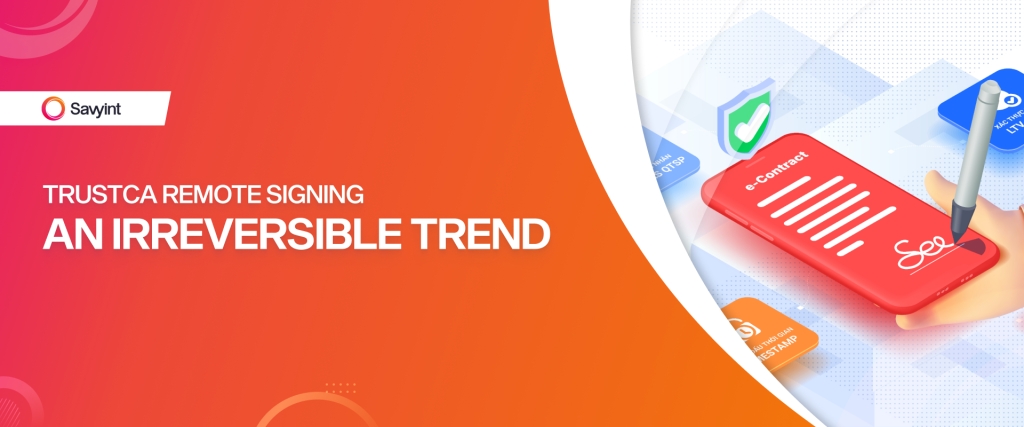
Since the COVID-19 pandemic, the need for remote work, online shopping, and digital communication has skyrocketed. As a result, the demand for secure digital signatures has grown exponentially. Remote Signing has emerged as a game-changer, transforming the way we sign and manage electronic documents. Digital signing with USB Token is no longer an optimal choice Digital signatures, akin to personal signatures or company seals, hold legal weight and significantly enhance efficiency. However, USB token-based digital signatures have several drawbacks, including limited compatibility, device dependency, and lack of mobility and scalability. Remote signing is the perfect alternative Remote Signing offers a superior solution, providing efficient, flexible, and secure electronic transactions. Unlike traditional methods, the private key for Remote Signing is securely stored in a service provider’s data center. Nevertheless, activation processes are rigorous, ensuring that even the service provider cannot activate or sign on behalf of the customer. In addition, Remote Signing offers numerous advantages, such as: Sign anytime, anywhere Remote Signing allows users to sign documents anytime, anywhere, without relying on physical devices like USB tokens or SIM cards. Users can sign directly on any mobile device, such as laptops, smartphones, or tablets. High security Remote Signing provides an exceptionally high level of security and reliability. The mechanism ensures that only the authorized user can activate and use the digital signature. Even the service provider cannot intervene in the activation or signing process without the customer’s authorization. Moreover, seamless integration with timestamping and long-term validation technologies (LTV, LTANS) enables the detection of any changes to the document, maximizing data integrity and preventing fraud and forgery in electronic transactions. Batch and bulk signing Users can sign multiple documents simultaneously through automated processes, eliminating the need for manual signing of each page. Easy integration with advanced digital signature technologies SavyintTimestamp, long-term validation, and long-term archiving (LTV, LTANS) can be easily integrated into this model. SAVYINT is proud to be the first trusted service provider in Vietnam to comply with the eIDAS regulation for remote signing services, setting the highest standard for security, reliability, and confidentiality in electronic transactions. This means that SAVYINT’ remote signing services are widely recognized in 27 European Union countries and are the first to provide a full range of services, from basic digital signatures to advanced and long-term validation signatures. In October 2021, we were granted a license by the Ministry of Information and Communications to provide remote signing services and became the only entity to fully comply with all mandatory technical standards and advanced digital signature standards, including long-term validation (AdES) as stipulated in Circular 16/2019/TT-BTTTT on remote signing models. QTSP Remote Signing – The perfect solution for individuals and businesses for electronic document signing. Contact SAVYINT today to own a quality remote signing solution!
eKYC solution using HyperLedger Fabric
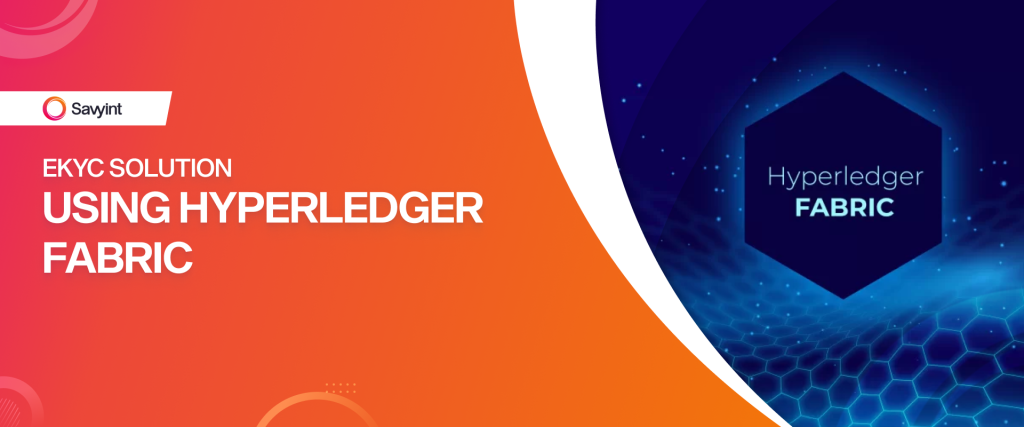
The Central Bank of Bahrain (“CBB”) has has launched the eKYC by financial institutions in the Kingdom as part of its initiatives for digital transformation in the sector. The eKYC solution built by Bahrain BENEFIT utilizes hyperledger Fabric Blockchain platform. The platform was built in collaboration with Avanza Innovation company. The national eKYC platform, which was the first of its kind in the region targeting retail banks, financial services providers and money exchange networks, is operated by BENEFIT in collaboration with the Information and eGovernment Authority (IGA) and under the supervision of the CBB. The platform provides a national digital identity database for financial institutions to securely verify the identities of their customers, validate their information and share data digitally before providing products and services. This includes retrieval of customer data from governmental entities including IGA. BENEFIT has also developed the Application Programming Interface (“API”) for the platform, which allows for seamless integration with financial institutions core systems, digital channels and mobile apps. With the introduction of Open Banking in Bahrain, this also provides an opportunity for fintech companies to verify customers identities through their online and mobile applications. Mr. Khalid Al Hamad, Executive Director of Banking Supervision at the CBB said “The CBB urges all licensed financial institutions to avail of this innovative and streamlined service and accelerate its efforts towards automating the maintenance of its customer data and reputation records, by implementing eKYC API integration with their core systems, digital channels and mobile apps. We continue to support technological advancement in the sector to minimize cost while also fostering innovation and integration between financial institutions and fintech companies. This is also in line with the CBB’s continuous efforts in developing the financial sector infrastructure in light of the Covid-19 repercussions to ensure appropriate solutions for electronic payment systems.” BENEFIT’s Chief Executive Officer Abdulwahid Janahi said “It gives us great pleasure to continue developing the eKYC platform in an effort to drive digital transformation in the Kingdom’s various sectors. We have succeeded in enabling the integration of this digital platform into core banking systems and smart phone applications, and we are pleased to announce that Bahrain Islamic Bank has successfully integrated this platform into its core banking services system, while “ila” Bank offers customer on-boarding in a completely digital and autonomous manner through its mobile app, both based on eKYC API integration. We look forward to the use of eKYC services on a larger scale during the coming period.” The Vice Chairman of eTransformation in the Information & eGovernment Authority (iGA), Dr.Zakareya Ahmed Alkhaja, confirmed that iGA cooperated with “BENEFIT” that implemented the technical development of the project, under the supervision of CBB. The project aims to provide an advanced comprehensive eSystem for financial entities to verify the identity of their customers and the validity of the information, before providing the financial services. He pointed out that the authority has started providing identity verification services to the government sector, and this project complements providing the services to the private sectors, especially the banking sector, as the project will allow the it to start providing innovative, high-quality, secure data services that keep the privacy of individuals. That will lead to enhance economic growth and expand commercial activities in the Kingdom. He expressed his pride that the (eKYC) project is the first of its kind in the region and the first at the level of global applications in terms of cooperation between the government and the banking sector, as the implementation of projects globally is limited to cooperation between banks in the private sector. This project is also one of the first Projects using Block Chain technology in the Kingdom of Bahrain. Source: https://www.unlock-bc.com/news/2021-02-01/central-bank-of-bahrain-launches-hyperledger-fabric-ekyc-platform-with-benefit/
TrustCA Remote Signing – A breakthrough in the digital signature “race”
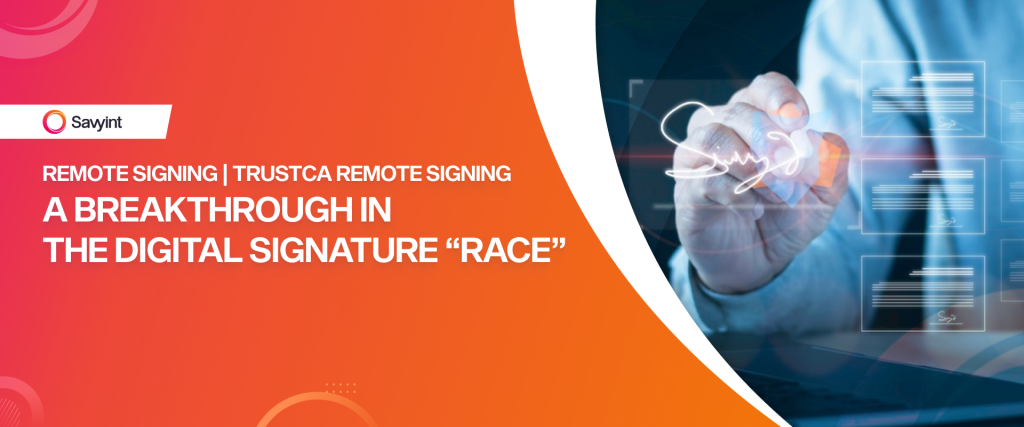
With the digital transformation wave sweeping across all industries, the application of digital signatures in electronic transactions has become more urgent than ever. However, the traditional USB token method has become one of the causes of inconvenience for organizations and individuals. USB tokens are no longer a suitable digital signing method While USB token-based digital signatures are still widely used and meet the basic digital signing needs of many organizations, as the number of documents to be signed increases, the demand for digital signing also increases significantly, along with higher requirements for signing speed, convenience, security, and reliability. In this case, USB tokens have many inconveniences: TrustCA Remote Signing – A leap forward in the digital signature race Pioneering research and development in digital signature systems, SAVIS is one of the first units to be granted a license by the Ministry of Information and Communications to provide digital signature certification services under the remote signing model in October 2021, called TrustCA Remote Signing. Now, with TrustCA Remote Signing, users do not need to carry a computer or USB with them when signing documents, but can easily sign directly on their mobile phones or tablets. Another plus of remote signing is that users can sign multiple documents at the same time in a dynamic process, batch signing without having to manually sign each page. Convenient, fast and minimizing risks, TrustCA Remote Signing commits to superior security levels with a mechanism to ensure: the key pair is under the sole control of the user, only the user can activate the signing key, and the service provider cannot interfere in this process. At the same time, TrustCA Remote Signing can be integrated with TrustCA Timestamp and long-term validation signature technologies (LTV, LTANS), helping to prevent fraud and forgery to the highest degree in electronic transactions. Integrity is affirmed when any changes to the document after the signing time. Along with the EU QTSP certification for digital signature services and electronic seals under the remote signing model, SAVYINT’s TrustCA Remote Signing is widely recognized in 27 countries of the European Union, promoting cross-border electronic transactions between Vietnamese organizations and businesses and EU partners. In particular, TrustCA Remote Signing is more user-friendly for individuals thanks to its flexibility, low cost, ease of use, and signing operations. This promotes the digitization of documents and contracts signed between individuals and individuals, individuals and organizations – a bottleneck that USB tokens have not been able to solve. TrustCA Remote Signing has created a powerful leap forward in the digital signature race, digitizing processes, authentication, and electronic document storage. Contact SAVYINT today for detailed advice on services and solutions!
QTSP and Remote Signing bring great competitive advantages to Vietnamese Financial – Banking organizations
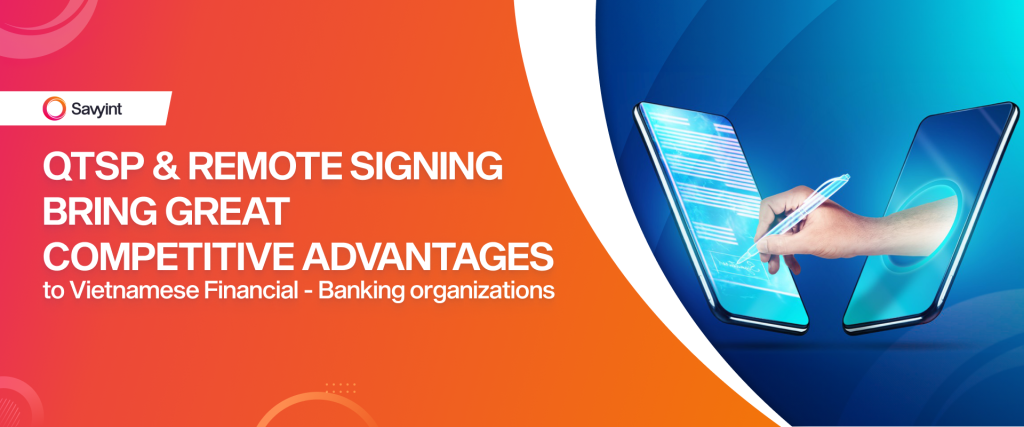
With QTSP certification for remote signing models, HSM digital signatures, and electronic authentication services provided by a QTSP in Vietnam, digital signatures and electronic certificates will be widely recognized in all 27 EU countries. This will bring a great advantage to domestic organizations and businesses, especially in the finance and banking sector. QTSP and the challenge of secure electronic authentication in transactions One of the most difficult challenges in the digital finance and economy is the process of secure electronic identification and authentication in transactions. Previously, banks operated their own specialized CA systems for parties to register for services. However, this system quickly became overloaded when third parties or multiple financial institutions registered and authenticated each other, leading to an increasingly complex and difficult-to-control identity database, not ensuring interoperability according to an international standard for system security operations. This issue contradicts the purpose of expanding the digital finance ecosystem of the Payment Services Directive 2 (PSD2) and, more recently, the Open Banking strategy of countries worldwide, hindering the development of the financial market in particular and the digital transformation of the economy and society in general. To solve this difficulty for banks and financial institutions, the Common Technical Standards (RTS) for the Payment Services Directive 2 (PSD2) issued by the European Banking Authority (EBA) has accepted the use of qualified electronic signatures (QES) and qualified electronic seals (QSeal) issued by a Qualified Trust Service Provider (QTSP) for the identification and authentication process under the Open Banking model. This opens up a trusted, legal, and widely recognized authentication method for banks and financial institutions participating in the global digital economy. The eIDAS regulation applies QTSP certification as the highest standard of security, reliability, and confidentiality in electronic transactions. Currently, only QES qualified electronic signatures for individuals and QSeal qualified electronic seals for organizations provided by a Qualified Trust Service Provider (QTSP) are recognized throughout the EU with the same legal effect as handwritten signatures or seals without the need for any other assessment or explanation procedures. Without using the electronic identification and authentication services of a QTSP, organizations participating in the digital financial market cannot perform electronic authentication processes with regulatory authorities. Failure to comply with the QTSP’s assured identification and authentication service standards will lead to numerous potential risks for organizations participating in the digital finance and economy: In addition, the financial market is one of the most sensitive markets to constant security risks and the risk of document forgery. Along with the Payment Services Directive 2 (PSD2), the Open Banking strategy in Europe also allows the trusted services of QTSPs to be the only method to ensure trust between payment service providers, customers, and financial institutions. Competitive advantages of Vietnamese financial institutions and banks from QTSP and remote signing models In July 2021, SAVYINT officially became the first trusted QTSP service provider for digital signatures, electronic seals, remote signing models, and HSM digital signatures in Vietnam, in accordance with EU eIDAS regulations. This means that all 27 European countries fully recognize the digital signature and electronic seal services provided by SAVYINT under the remote signing model. Operating under the SCAL2 security authentication mechanism, the system ensures that only the signer has the right to activate the signing key stored securely on the HSM encryption device, uniquely controlling the signing key, and fully complying with the requirements for the SAM module with CC EAL4+ certification with EN 419 241-2. This will open up opportunities for Vietnamese organizations and businesses to conquer the European market, promote the development of cross-border electronic transactions and e-commerce, and enter the common playground of Vietnam with EU partners in the context of the Vietnam-EU Comprehensive Partnership Agreement and the EVFTA. For providers of electronic payment and transaction services such as financial institutions and banks, having a QTSP in Vietnam will help solve a major bottleneck in the digital finance ecosystem, digital banking, and open banking, aiming to expand the market and integrate into the international arena. This is the unification and interconnection in the process of secure electronic identification and authentication, creating a synchronized electronic transaction market according to a common technical standard, reducing congestion and transaction interruptions due to rejections by the parties involved. Quick application and full utilization of the advantages of electronic authentication and digital signature services from a trusted QTSP service provider will help financial institutions and banks modernize and comprehensively digitize electronic transactions, promote e-commerce, build digital banking and open banking systems, and aim to attract more new customers, new markets, and increase revenue and profits. Connect with SAVYINT now to get advice on specialized solutions for developing Digital Banking and Open Banking!
QTSP certification– Differentiation of digital signing service according to Remote Signing model from a QTSP according to EU eIDAS regulations
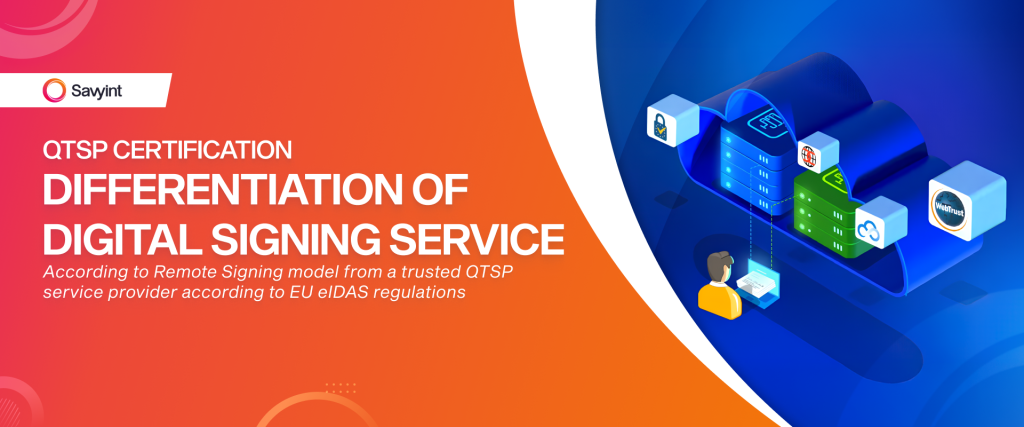
QTSP certification – Distinguishing Remote Signing Services from a Trusted Service Provider under the EU eIDAS Regulations. QTSP certification is one of the most important certifications under the European Union’s eIDAS Regulation on electronic identification and trust services. It lays the foundation for legalizing electronic contracts, documents and certificates signed between Vietnamese individuals and organizations and their EU partners. Remote signing services provided by a QTSP offer numerous advantages. QTSP certification Regulation 910/2014 of the European Union (also known as the eIDAS Regulation) is the most comprehensive legal framework for electronic signatures, electronic seals, electronic timestamps, electronic delivery, and website authentication. Accordingly, eIDAS recognizes the legal validity of trusted services and electronic documents, enabling the cross-border use of trusted services, electronic signatures, electronic seals, and electronic timestamps among all EU member states. European individuals, organizations, and authorities cannot refuse the evidentiary value of evidence solely because it is in electronic form. To build trust among organizations and individuals in the European common market, the eIDAS Regulation mandates the Qualified Trust Service Provider (QTSP) certification as the highest standard for security, reliability, and confidentiality in electronic transactions. Currently, only Qualified Electronic Signatures (QES) for individuals and Qualified Electronic Seals (QSeal) for organizations, provided by QTSPs, are recognized throughout the EU with the same legal effect as handwritten signatures or organizational seals, without requiring any further evaluation or explanation. To become a Qualified Trust Service Provider (QTSP), organizations must undergo rigorous audits and assessments by the national Supervisory Body (SB) from the preparation phase to post-assessment monitoring and service maintenance. Full compliance with all eIDAS requirements is mandatory before providing services. To maintain trust, QTSPs are required to undergo compliance assessments by EU Conformity Assessment Bodies (CABs) at least every two years. The distinctiveness of Remote Signing services from a QTSP under EU eIDAS regulations – TrustCA Qualified Remote Signing In July 2021, SAVIS officially became the first Vietnamese QTSP providing remote signing, electronic seal, and HSM-based digital signature services, in compliance with EU eIDAS regulations. This means that all 27 EU countries fully recognize the remote signing and electronic seal services provided by SAVIS. Operating under the SCAL2 security authentication mechanism, the system ensures that only the signer can activate the private key securely stored on the HSM device, providing sole control over the key. It fully complies with the SAM Module requirements and holds a CC EAL4+ certificate with EN 419 241-2. Compared to Vietnamese regulations such as Decree 130/2018/ND-CP and Circular 16/2019/TT-BTTTT, SAVIS is fully capable of providing remote signing services, meeting all mandatory technical standards for electronic authentication and digital signature services. Furthermore, SAVIS surpasses these standards by adhering to the highest levels of the eIDAS Regulation and ISO/IEC 27001 in terms of management, operation, and system security. In 2024, SAVIS GROUP established SAVYINT with the mission of globalization. Therefore, digital signature services of SAVIS and SAVYINT are widely accepted not only in Vietnam but also in the EU for cross-border trade. For providers of electronic payment and transaction services, such as financial institutions and banks, the presence of a Vietnamese QTSP will address a major bottleneck in the digital finance ecosystem. It will facilitate market expansion and international integration by ensuring a unified and interoperable secure electronic identification and authentication process. This will create a synchronized electronic transaction market based on a common technical standard, reducing congestion and transaction disruptions caused by disputes between parties. Rapid adoption and full utilization of electronic authentication and digital signature services from a QTSP will enable organizations to modernize and fully digitize their electronic transactions, boost e-commerce, and build digital banking and open banking systems. This will attract new customers and markets, driving revenue and profit growth. Additionally, the shift to remote signing will provide an advanced digital signature solution, allowing users to sign documents anytime, anywhere, on any device with superior security and reliability, without the need to worry about storing key storage devices or finding suitable connection ports. Comparing SAVYINT digital signature service and other public digital signature services in Vietnam Criteria SAVYINT – Qualified Remote Signing &TrustCA Timestamp Other Public Digital Signature Service Providers Ensuring the security, reliability, and non-repudiation of digital signatures in electronic transactions Applying Advanced Electronic Signatures (AdES) with non-repudiation electronic timestamps to create reliable evidence of the timestamp of the formation of electronic transactions/documents.Supporting Longterm Validation (LTV) technology, which allows for the verification of the validity of digital signatures after 10, 20, or even indefinitely, without relying on the certificate’s lifecycle or service provider. Applying Basic Signatures without timestamps, there is no reliable evidence of the date and time of the formation of the electronic document/ transaction. The signing time can be modified, forged, disputed, repudiated, or subject to legal disputes without any protective evidence. Digital signatures fully comply with the technical specifications in Circular 06/2015/TT-BTTTT, requiring a key length of 2048 bits or more and the RSA algorithm with the SHA-256 hash function. Digital signatures that do not comply with the technical specifications stipulated in Circular 06/2015/TT-BTTTT, such as having a key length less than 2048 bits or using the compromised SHA-1 hash algorithm, pose a risk of undetectable forgery. Such digital signatures are no longer secure for electronic transactions. Ensuring document authenticity for 10, 20 years or even permanently, depending on specific regulations or the purpose of storing signed electronic documents Applying Advanced Electronic Signatures (AdES) and Qualified Electronic Signatures (QES) with electronic timestamps and Longterm Validation (LTV) technology to create reliable and verifiable evidence of the signature’s validity at the time of signing. The validity of the digital signature is independent of the validity of the individual or legal entity’s certificate, and can be independently verified for 10, 20 years, or even permanently. Therefore, users benefit from the highest level of security: no dependence on service providers, no need to maintain certificates, and no need to re-sign electronic documents. Applying Basic Signatures, which depend on the certificate’s lifecycle. Once the certificate expires, the signed document
Remote Signing – The future of digital signature

With new demands and changing user habits requiring more flexible and mobile digital transformation tools such as electronic document signing, the Remote Signing model and HSM-based signing are gradually replacing traditional USB token-based signing methods. USB token-based signing is becoming obsolete Digital signature services play a crucial role in digital transformation and are the first essential tool that organizations and individuals must equip themselves with in the digitalization process. However, the currently popular USB token-based signing methods have many significant drawbacks such as poor compatibility, dependence on device connection ports, lack of mobility and flexibility, and unsuitability for organizations with large signing needs or those requiring simultaneous signing of multiple electronic documents. Meanwhile, technology and pandemic-related lockdowns have required people to work remotely, handle business, and interact with customers anytime, anywhere, on any device. A critical solution for signing electronic contracts, transactions, and documents, such as digital signatures, seems to be lagging behind the new requirements. Moreover, USB tokens or smart cards have low security levels, no longer meet the standards of many countries, and are at risk of being phased out in the near future. Remote signing is the future of digital signature Switching to the Remote Signing model and HSM-based signing will be a reasonable alternative and will become increasingly popular. Only remote signing can enable users to sign anytime, anywhere, on any device with superior reliability and security, without worrying about storing key storage devices or finding suitable connection ports. Remote signing models also allow for the development of high-speed digital signature systems, capable of simultaneously signing multiple documents and papers through automated processes, completely eliminating time-consuming manual page-by-page signing. Advanced signature forms such as timestamped signatures and signatures using long-term validation (LTV) technology can also be easily integrated into this remote signing model. SAVYINT – The first Qualified Trust Service Provider (QTSP) for digital signatures and electronic seals following the Remote Signing model in Vietnam With QTSP certification for providing remote signing services in accordance with EU eIDAS regulations, SAVYINT’s digital signature and electronic seal services will be widely recognized in the 27 member states of the European Union. Moreover, in compliance with Vietnamese law such as Decree 130/2018/ND-CP and Circular 16/2019/TT-BTTTT on the list of mandatory technical standards applicable to digital signatures and electronic authentication services using mobile device signing and remote signing models, SAVYINT fully complies with and exceeds the requirements for system management, operation, and security. Equipped with a SAM module that meets CC EAL4+ certification with EN 419 241-2, SAVYINT’s remote signing system ensures the highest level of security for users’ signing keys stored on secure HSM devices compliant with EN 419 221-5, which resists attacks using the advanced SCAL2 authentication mechanism. Therefore, we have the full capacity to provide remote signing services in both Vietnam and the European Union. By using SAVYINT’s digital signature services, organizations and businesses will have a significant competitive advantage when signing with European partners, promoting the development of cross-border electronic transactions and e-commerce, especially in the context of the pandemic hindering traditional trade. In addition, SAVYINT/TrustCA is also the first and only provider of timestamping services in Vietnam with TrustCA Timestamp. With these conditions, SAVYINT’s digital signature and electronic authentication services can provide the highest level of protection against fraud and forgery in electronic transactions, ensure legal validity for electronic storage, validate documents long-term and reliably even after the digital certificate expires, and completely replace paper documents, eliminating the need for daily printing and archiving. Furthermore, we have been and are providing an ecosystem of technological solutions for electronic documents and transactions with outstanding features that comply with both Vietnamese regulations and international standards, which no other provider in Vietnam can match from eContract, SAVYINT Paperless, SAVYINT eKYC electronic identification, to electronic digitization and archiving – SAVYINT eArchive,… Contact us now for the fastest product and service consultation!
Ensuring legal validity of electronic contracts with Smart eContract
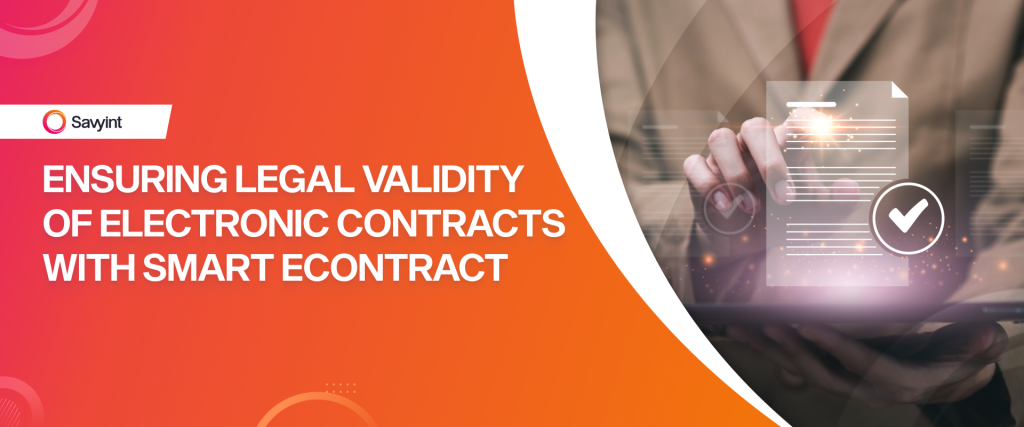
Electronic contracts have revolutionized cross-border digital transactions by eliminating the delays associated with geographical distance and the physical transfer of paper documents. However, electronic contracts still present significant legal risks. Electronic contracts: Driving enterprise digital transformation In today’s highly competitive business environment, the ability to process work, handle paperwork, and sign contracts quickly is a significant competitive advantage. It streamlines operations, enhances customer satisfaction, and reduces costs. To improve organizational workflows, many businesses are adopting electronic contracts as a replacement for traditional paper-based contracts. Implementing electronic contracts offers numerous benefits, including significant cost savings on printing, shipping, and storage. Additionally, electronic contracts enable seamless approval and signing processes, anytime, anywhere, eliminating the need for physical meetings and wait times. Common risks associated with electronic contracts Despite their advantages, electronic contracts still present certain legal risks. These include: Smart eContract: Mitigating legal risks in electronic contracts With the ability to automate document creation, signing, storage, delivery, and retrieval, SAVIS eContract empowers organizations to build paperless electronic contracts quickly, cost-effectively, and securely. Every action taken on an electronic contract is tracked, ensuring content integrity, accurate identification of parties involved, and secure storage. Combined with timestamping and long-term validation technology (LTV), which is considered the most effective solution to prevent fraud and forgery in electronic transactions and ensure the legal validity of electronic documents, particularly contracts, parties to the agreement can use these documents as evidence in business and legal activities that require verification. Start your journey with a consultation – reach out to us today!
4 Key points to consider when choosing an electronic contract solutions

Electronic contracts are being increasingly adopted to meet the growing demand from businesses and organizations, gradually replacing traditional contracts. However, selecting the right electronic contract solution can be challenging. Below are four key criteria for choosing the best electronic contract solution. Criteria for Selecting an Electronic Contract Solution Compliance with Vietnamese Laws on Electronic Storage and Digital Signatures In Vietnam, the legal validity of electronic contracts is governed by the Law on Electronic Transactions of 2005 and Decree 52/2013/ND-CP. According to these regulations, an electronic contract must meet the following requirements: Additionally, the digital signatures used in electronic contracts must comply with the technical standards outlined in Vietnam’s laws, such as Decree 130/2018/ND-CP, Circular 16/2019/TT-BTTTT, Circular 06/2015/TT-BTTTT, and Circular 22/2020/TT-BTTTT regarding the mandatory standards for digital signatures and certification services. Provider capability Along with the contracting parties, a third party—the electronic contract solution provider—is essential. Therefore, it is crucial to choose a provider with the necessary technological capabilities and a solid reputation. Software quality Software quality is a critical factor when selecting an electronic contract solution. A high-quality solution should ensure: Suitability for the organization’s scale and needs To select the most appropriate solution, decision-makers must analyze their organization’s specific requirements and use cases. Depending on the scale, usage frequency, cost, security needs, and business integration demands, organizations may choose between an on-premise model or a cloud-based solution. Smart eContract: A Smart Electronic Contract Solution that Meets All Standards Developed by SAVIS, Smart eContract is designed to meet the digitalization and automation needs of organizations and businesses. It complies with all the requirements of a comprehensive electronic contract. As the top provider of digital signature services in Vietnam, SAVIS consistently pioneers innovative technologies and features that meet international standards while addressing local business needs. With QTSP certification, Remote Signing services via TrustCA, and Vietnam’s first and only electronic timestamp certification service—TrustCA Timestamp—SAVYINT is building a complete ecosystem for electronic documents, transactions, and e-commerce, all while adhering to both local and international regulations. SAVYINT offers various digital signature solutions, including Smart eContract (the intelligent electronic contract) and SAM Appliance (a key management and digital signature device). These innovations solidify SAVYINT’ position as the top provider of digital signature solutions. Smart eContract complies strictly with Vietnamese laws on electronic contracts and digital signatures, as well as electronic document storage regulations. The solution adheres to the technical standards required by Decree 52/2013/ND-CP, as well as Decree 130/2018/ND-CP, Circular 16/2019/TT-BTTTT, Circular 06/2015/TT-BTTTT, and Circular 22/2020/TT-BTTTT. SAVIS is the only provider in Vietnam that fully meets the mandatory technical standards and advanced digital signature standards (AdES), including long-term validation (LTV) and timestamping, required by the European Union. Advanced features of Smart eContract Smart eContract is the first and only solution in Vietnam to integrate advanced digital signing features such as AdES (advanced electronic signatures), timestamping, long-term validation (LTV), and long-term archive and notarization services (LTANS), ensuring storage for 10, 20 years, or even permanently. Save up to 90% in time and costs Compared to traditional contracts, Smart eContract reduces operational, printing, shipping, and paper storage costs significantly. With dynamic workflows, all operations can be completed electronically, minimizing processing time for organizations and businesses. Contact SAVYINT now for the best support!
SAVYINT and ENTRUST Strengthen Collaboration in PKI and Blockchain Development in Vietnam

SAVYINT is a leading provider of best-in-class trusted solutions and services. Its strategic partnership with ENTRUST to develop PKI and Blockchain systems marks significant progress in the quality and product offerings of SAVYINT. Founded in 1969 and headquartered in Minneapolis, Minnesota, USA, ENTRUST employs over 2,500 people globally and is a world leader in secure transaction and trusted authentication technology. In 2020, the company rebranded from Entrust Datacard to ENTRUST Corp., with a focus on secure identities, payments, and data protection. ENTRUST has expanded its offerings through acquisitions, including nCipher for hardware security modules (HSM), HyTrust for data security management, and WorldReach for cloud infrastructure, creating a comprehensive product ecosystem with seamless customer experiences. SAVYINT is one of ENTRUST’s key partners in providing security and digital identity solutions. The collaboration includes the development of ENTRUST’s products such as: During a recent meeting between ENTRUST and SAVYINT, Chris Siah, Director of Digital Security Solutions for ASEAN & China at ENTRUST, emphasized, “ENTRUST’s solutions meet international standards such as eIDAS, GDPR, PSD2, HIPAA, and more. In Southeast Asia, we continue to upgrade our strategic security, encryption, and digital identity solutions to match local market demands and regulations. SAVYINT is a leading brand in Vietnam’s IT sector, and we are confident that this partnership will drive ENTRUST’s further expansion in Vietnam.” Mr. Van Hoang Nguyen – Chairman of the Board of SAVYINT, added, “Post-COVID-19, the market for cross-border digital transactions is primed for growth. The expansion of PKI and Blockchain applications in healthcare, education, and finance is advancing rapidly, driven by the vibrant digital transformation in Vietnam. SAVYINT is the first in Vietnam to achieve QTSP certification for providing electronic signature and remote signing services that comply with the EU’s eIDAS regulations. This is a key competitive advantage as SAVYINT’s services are recognized across 27 European countries. With our strong foundation and ENTRUST’s top-tier products, we look forward to even closer collaboration in the future.” SAVYINT is solidifying its leadership position in the digital signature market, gaining certifications for key services like TrustCA Timestamp and TrustCA Qualified Remote Signing. This partnership between SAVYINT and ENTRUST promises to deliver comprehensive security for digital signature applications, electronic identity and authentication systems, and Blockchain, fully complying with both Vietnamese and global information security regulations.
Digital transformation with Smart eContract
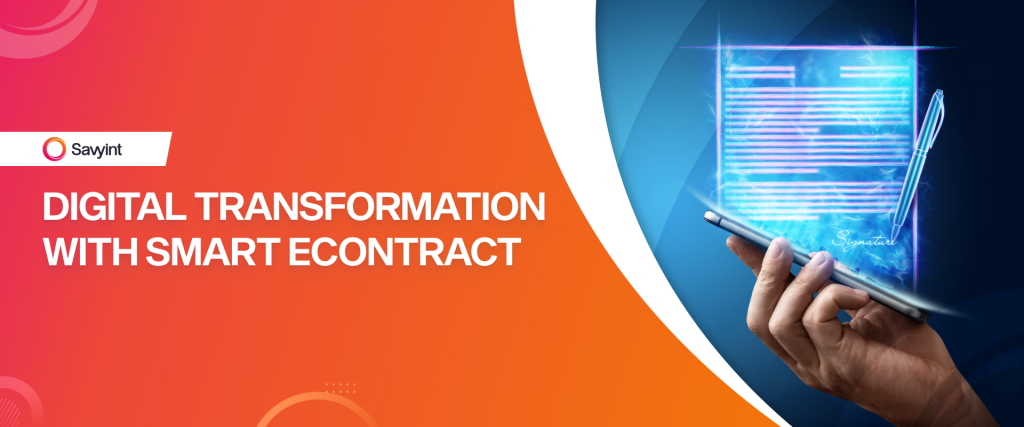
Electronic contracts are considered a foundational solution for enterprise digital transformation, serving as a crucial step in driving the growth of contactless electronic transactions. Digital transformation is not just a trend but a mandatory requirement in the digital age. Many businesses, especially small and medium-sized enterprises, are accelerating their digital transformation to join the Industry 4.0 wave. However, the reality is that not all businesses succeed. According to a McKinsey report, over 70% of businesses fail in their digital transformation efforts. Lack of leadership commitment, insufficient knowledge of digital transformation, and shortages of resources and finances are common obstacles faced by many Vietnamese businesses. In particular, the biggest bottleneck for many businesses is a lack of information about digital technology. Many business owners do not know what digital transformation is, where to start, and which technologies and solutions are best suited for their business. Electronic contracts as a lever for digital transformation Applying appropriate digital processes and technology solutions helps businesses optimize operations and gradually achieve solid digital transformation. In this process, businesses need to identify that the first and most important step in digital transformation is to digitize documents, build an electronic document system, and thereby form a paperless digital working environment. And contracts are one of the important documents that need to be prioritized when digitizing processes. Regarding electronic contracts, the legal framework has been and continues to be perfected. The Law on Electronic Transactions No. 51/2005/QH11 recognizes the legal value of electronic contracts: “The legal value of an electronic contract cannot be denied solely because it is expressed in the form of a data message.“ In addition, Article 33 of the Law on Electronic Transactions 2005 requires an electronic contract to meet the following conditions to be considered valid: Smart eContract – Intelligent electronic contracts for all businesses Smart eContract is an electronic contract solution developed by SAVYINT to serve the needs of digitizing and automating electronic contract signing processes for all organizations and businesses on multiple platforms (software, apps, web, etc.). Parties to an electronic contract do not need to meet in person, saving time and avoiding risks related to the transportation and storage of paper documents. Automated processes, 100% paperless With just a single software, businesses can create documents, customize approval processes, digitally sign contracts, send, receive, and store electronically, ensuring a seamless, automated, and 100% paperless process. Review, edit, and sign anytime, anywhere Smart eContract allows for easy use on mobile devices such as laptops, tablets, and mobile phones. In addition, the software supports common digital signature forms such as USB tokens, remote signing, and mobile device signing, helping organizations and businesses operate easily, intuitively, and process documents and sign contracts anytime, anywhere in just a few minutes. Save up to 90% of time and costs With a traditional paper contract, businesses have to bear various costs such as: operating costs, printing, transportation, and manual storage costs. Not to mention the loss, dependence on third-party carriers, or other objective factors that can cause the contract to take many days to complete. If applying electronic contracts, all operations can be performed on a network environment. As a result, the contract signing process is not interrupted, minimizing risks due to the usual delivery process, and shortening the processing time to the maximum for organizations and businesses. Ensure legality, reliability, integrity, and accessibility The Smart eContract intelligent electronic contract software allows the standardization of input digitized documents into documents with formats such as TIFF, PDF/A, and also supports advanced signature standards such as CAdES, PadES, XadES, and integrates with the TrustCA Timestamp digital signature and long-term validation technology standards LTV, LTANS to serve long-term storage and authentication of electronic documents, thereby ensuring the reliability and integrity of signed electronic certificates. Smart eContract – FAST, SAVING, SECURE! Contact SAVYINT today to own a quality electronic contract solution!
